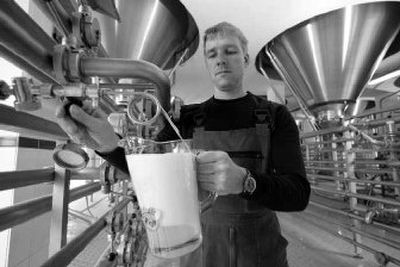Trouble brews in Germany

AYING, Germany — Like most Germans, brewer Helmut Erdmann is all for the fight against global warming. Unless, that is, it drives up the price of his beer.
And that is exactly what is happening to Erdmann and other German brewers as farmers abandon barley — the raw material for the national beverage — to plant other, subsidized crops for sale as environmentally friendly biofuels.
“Beer prices are a very emotional issue in Germany — people expect it to be as inexpensive as other basic staples like eggs, bread and milk,” said Erdmann, director of the family-owned Ayinger brewery in Aying, an idyllic village nestled between Bavaria’s rolling hills and dark forests with the towering Alps on the far horizon.
“With the current spike in barley prices, we won’t be able to avoid a price increase of our beer any longer,” Erdmann said, stopping to sample his freshly brewed, golden product right from the steel fermentation kettle.
In the last two years, the price of barley has doubled to $271 per ton as farmers plant more crops such as rapeseed and corn that can be turned into ethanol or biodiesel, a fuel made from vegetable oil.
As a result, the price for the key ingredient in beer — barley malt, or barley that has been allowed to germinate — has soared by more than 40 percent, to around 385 euros or $522 per ton, from around 270 euros a ton two years ago, according to the Bavarian Brewers’ Association.
For Germany’s beer drinkers that is scary news: Their beloved beverage — often dubbed “liquid bread” because it is a basic ingredient of many Germans’ daily diet — is getting more expensive. While some breweries have already raised prices, many others will follow later this year, brewers say.
Talk about higher beer prices has not gone unnoticed by consumers. Sitting at a long wooden table under leafy chestnut trees at the Prater, one of Berlin’s biggest beer gardens, Volker Glutsch, 37, complained bitterly.
“It’s absolutely outrageous that beer is getting even more expensive,” Glutsch said, gulping down the last swig of his half-liter dark beer at lunch. “But there’s nothing we can do about it — except drinking less and that’s not going to happen.”
A meager barley harvest last year in Germany and barley-exporting countries such as France, Australia and Canada has compounded the problem. The price rise is squeezing breweries — many of them smaller, family-owned enterprises that can ill afford it.
The Ayinger Brewery, which has 65 employees and has been family owned since its founding in 1878, produces 1.98 million gallons of beer each year and purchases most of the ingredients from farmers nearby.
Eventually, Erdmann and other brewers say, it is drinkers who will bear the brunt of the higher costs for raw materials.
Already, at the annual brewery festival in Aying this week, prices for Erdmann’s Ayinger beer were up at $8.60, or 6.40 euros, from last year’s 6.10 euros for a 34-ounce mug. That’s no small matter for Bavarians, who are among the world’s heaviest beer drinkers. They put away about 42 gallons of beer a year — well above the already high German average of 30.38 gallons per person.
And organizers of the world-famous Oktoberfest in Munich have announced a 5.5 percent price increase: A one-liter mug will cost up to $10.70 at this year’s autumn beer festival — the highest price ever.
Brewers predict that higher barley prices will add about $1.35 to each 10-liter case of beer, but the German Farmers Association disputes that, saying the figure is about 45 cents. Other factors like higher salaries and energy prices are also jacking up prices.
“The financial pressure on Germany’s small and medium-sized breweries is immense,” brewers association head Walter Koenig said. “The increasing costs of raw materials may become a serious threat for many breweries.”
“Beer drinkers across the country will get upset when beer prices will rise even further in the fall,” said Koenig. “We are therefore demanding that government stop its subsidies for biofuels immediately.”
However, in its first major report on bioenergy, the United Nations tried to temper enthusiasm over biofuels last week, warning that the diversion of land to grow crops for fuel will increase prices for basic food commodities.